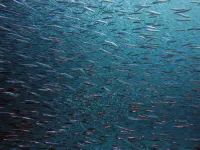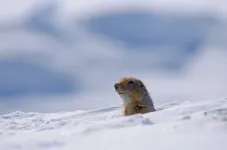(Press-News.org) Word choice matters—a lot— when it comes to research. That’s the main takeaway from a new article co-authored by Edson College of Nursing and Health Innovation Assistant Professor Angel Algarin and published in Health Communication.
“Researchers in any field should be cognizant of the language they’re using to describe the people they study so they don’t inadvertently add to the use of stigmatizing language,” said Algarin.
For the article, Algarin and his co-authors performed a content analysis of HIV-related stigmatizing language published in scientific literature from 2010 to 2020.
They found 26,476 peer-reviewed articles that used variations of the stigmatizing term “HIV/AIDS-infected.” More than a third of these articles came from the United States. And the journal that used the stigmatizing language the most was one that focused on general science and medicine.
“The use of stigmatizing language in science is concerning as the words we use are read by health care professionals, policymakers and journalists, who in turn, use this same language when discussing topics surrounding HIV because they trust that we are the experts,” Algarin said.
The consequences of using terms that stigmatize entire groups of people are well documented. As a social epidemiologist and interventionist, Algarin’s previous work has focused on the impact of stigma on people living with HIV.
In his 2020 articles published in AIDS and Behavior and AIDS patient care and STDs, he found that people living with HIV who experienced higher levels of stigma experienced poorer mental health and HIV care outcomes.
Elijah Palles has experienced stigmatizing language firsthand in peer-to-peer conversations and in health care settings. Shortly after he was diagnosed with HIV he said he encountered a case manager who was “shocked” that someone “like him” with a job and a car and a house could be living with HIV.
“I felt stupid because I do have resources and I do know better but I beat myself up for a while thinking she’s right, I’m not the typical person who would contract this, and then I had to say, well no, I’m just like every other person who contracts this. So that interaction fed into my own internalized stigma for a while,” Palles said.
As a Valleywise Health Voices of Hope Speakers Bureau member and Maricopa County Department of Public Health Positively You! Ambassador, Palles regularly shares his story to help raise awareness about resources available, combat misinformation and reduce HIV-related stigma. Recently, he spoke with students at Edson College as part of a public health presentation by the county.
He says Algarin’s work on this issue is important and much needed.
“They are in the driver’s seat of the conversation, and if you’re using a term like “HIV infected,” that is very stigmatizing because you’re saying someone is infected and that goes back to this idea of clean vs. dirty,” Palles said.
The point of Algarin’s article wasn’t to call anyone out, but instead, to highlight the real-world impact of researchers’ work and more specifically how the words they use affect people.
“I understand that people engaged in research may not intentionally be using stigmatizing language, but we should see this as an opportunity to do better,” said Algarin.
Indeed, Edson College Associate Dean of Research Initiatives Support and Engagement, David Coon, says there is always room for improvement. And one of the key ways to avoid harmful terminology is to connect with the community and population you research.
“At ASU and Edson College, we take our commitment to social embeddedness seriously. So it’s imperative that we listen to the voices of the communities we work with and do our best at every step in terms of the language we use in how we communicate with them and about them. In doing so we respect their choices about how they self-identify and want to be represented in research,” Coon said.
Raising the issue has resulted in some positive changes. According to the article, the use of stigmatizing language specific to HIV/AIDS started to decrease after the Joint United Nations Programme on HIV/AIDS released an update to HIV terminology guidelines.
In addition to referencing language guides on appropriate terms to use, Algarin says there are three specific actions researchers can take to reduce the stigma in scientific literature:
Ensure the use of appropriate terms in the manuscripts you’re writing.
Suggest the use of non-stigmatizing terms when serving as a peer reviewer.
If you are an editor, implement a non-stigmatizing terminology policy in the instructions for authors.
“Implementing these practices can show the communities that we work with that we are not only listening, but we are actively making changes to respect preferred, non-stigmatizing terminology. It is my hope that making these changes bring us one step closer to ending the perpetuation of stigma in science,” Algarin said.
END
Words matter: How researchers can avoid stigmatizing language
New research offers insights into how researchers can use their platforms to help end the use of stigmatizing language
2023-05-25
ELSE PRESS RELEASES FROM THIS DATE:
Chip-based QKD achieves higher transmission speeds
2023-05-25
WASHINGTON — Researchers have developed a quantum key distribution (QKD) system based on integrated photonics that can transmit secure keys at unprecedented speeds. The proof-of-principle experiments represent an important step toward real-world application of this highly secure communication method.
QKD is a well-established method of providing secret keys for secure communication between distant parties. By using the quantum properties of light to generate secure random keys for encrypting and ...
The brain’s protein-destruction machine learns new tricks at synapses, revealing a potential target for treating neurological disorders
2023-05-25
Darwin’s theory of evolution highlighted the importance of adaption and diversity in the natural world. Inside a biological cell, can proteins also perform new functions in new contexts? The answer seems to be yes for the brain’s primary protein-degradation machine, especially when it is placed at synapses, revealing a hitherto unknown mechanism that allows synapses to change in response to different circumstances.
The role of the regulatory (19S) proteasome particle has always been exclusively linked to its functioning in the proteasome complex, where it collaborates with the catalytic (20S) particle to recognize ...
Polar fish are less likely to die early, so they prioritize growth over reproduction
2023-05-25
Polar fish experience lower mortality than tropical fish, allowing them to delay reproduction until later in life when they are larger and can produce more eggs, according to a study by Mariana Álvarez-Noriega at Monash University in Australia and colleagues, publishing May 25th in the open access journal PLOS Biology. This may have implications for the effects of climate change on the sustainability of fish populations.
Organisms face a trade-off around when is the best time to reproduce. Fish continue to grow throughout life and larger fish tend to produce disproportionately more eggs than smaller fish, so it ...
Arctic ground squirrels changing hibernation patterns
2023-05-25
Arctic ground squirrels are unique among mammals. Their ability to keep from freezing even when body temperatures dip below that mark on the thermometer enables them to survive extreme winter climates. New research published in Science analyzes more than 25 years of climate and biological data. The findings include shorter hibernation periods and differences between male and female hibernation periods. Spoiler alert - the girls “rise and shine” a little earlier in response to warming, which could have both positive and negative ripple effects throughout the food web in these ecosystems.
Senior ...
As Arctic warms, female arctic ground squirrels end hibernation before males – a mismatch with consequences
2023-05-25
As Alaskan permafrost warms, hibernating arctic ground squirrels generate less heat, causing females to emerge from hibernation up to 10 days before their male counterparts – a mismatch that could have large, cascading ecological impacts. The findings of the related study reveal both direct and indirect impacts of a warming world. Winter temperatures play a fundamental role in fitness and population dynamics for many species that live in higher latitudes. However, in the Arctic, where warming is occurring more rapidly than most other places on ...
Stressed soil microbial communities bolster tree resilience to changing climates
2023-05-25
Soil microbiota transplanted from more stressful environmental conditions – drought or excessive heat or cold, for example – can enhance tree tolerance to changing climates, researchers report. The findings suggest that management of soil microbiota, especially during forest restorations, could be a valuable strategy for increasing forest resilience to climate change. Climate change is forcing many species outside of their evolved range of environmental tolerances, forcing them to acclimate, adapt, or migrate to avoid extinction. For long-lived ...
Combining data types refines grasp of French Canadian ancestry in Quebec, revealing how local topographies influenced relatedness, and more
2023-05-25
Combining a comprehensive dataset – including marriage documents – compiled from more than 4 million Catholic parish records with genotype data for more than 22,000 French and French Canadian individuals, researchers have conducted a novel analysis of French Canadian ancestry in Quebec, Canada, since the 17th Century. While most other population genetic models provide only coarse representations of a region’s real-world ancestry, this new approach reveals detailed insights into historic European colonization, migration, and settlement patterns, reflecting intricate French Canadian population structures within geographic constraints. ...
International pandemic governance need not prioritize compliance and sanctions
2023-05-25
In a Policy Forum, Mark Eccleston-Turner and colleagues argue that upcoming negotiations surrounding the World Health Organization (WHO) international pandemic treaty need not be overly focused on formal compliance mechanisms and sanctions. Instead, Eccleston-Turner et al. suggest that any efforts to ensure compliance should be part of broader efforts to ensure effective and equitable implementation across all member states. Member states of the World Health Organization (WHO) are preparing for ambitious ...
River erosion can shape fish evolution, study suggests
2023-05-25
If we could rewind the tape of species evolution around the world and play it forward over hundreds of millions of years to the present day, we would see biodiversity clustering around regions of tectonic turmoil. Tectonically active regions such as the Himalayan and Andean mountains are especially rich in flora and fauna due to their shifting landscapes, which act to divide and diversify species over time.
But biodiversity can also flourish in some geologically quieter regions, where tectonics hasn’t shaken up the land for millennia. The Appalachian Mountains are a prime example: The range ...
River erosion drives fish biodiversity in the Appalachians
2023-05-25
New Haven, Conn. — The gradual erosion of layers of rock by rivers flowing through the Appalachian Mountains generates biodiversity of freshwater fish species, suggests a new Yale-led study that offers insight into the causes of species richness in the ancient mountain range.
Researchers have previously associated high biodiversity in mountain ranges, including the Andes and Himalaya, with tectonic uplift — the shifting of plates in the Earth’s crust that forms mountains, plateaus, and other geologic structures — triggering environmental changes that create conditions ripe for species diversification. ...
LAST 30 PRESS RELEASES:
Bug beats: caterpillars use complex rhythms to communicate with ants
High-risk patients account for 80% of post-surgery deaths
Celebrity dolphin of Venice doesn’t need special protection – except from humans
Tulane study reveals key differences in long-term brain effects of COVID-19 and flu
The long standing commercialization challenge of lithium batteries, often called the dream battery, has been solved.
New method to remove toxic PFAS chemicals from water
The nanozymes hypothesis of the origin of life (on Earth) proposed
Microalgae-derived biochar enables fast, low-cost detection of hydrogen peroxide
Researchers highlight promise of biochar composites for sustainable 3D printing
Machine learning helps design low-cost biochar to fight phosphorus pollution in lakes
Urine tests confirm alcohol consumption in wild African chimpanzees
Barshop Institute to receive up to $38 million from ARPA-H, anchoring UT San Antonio as a national leader in aging and healthy longevity science
Anion-cation synergistic additives solve the "performance triangle" problem in zinc-iodine batteries
Ancient diets reveal surprising survival strategies in prehistoric Poland
Pre-pregnancy parental overweight/obesity linked to next generation’s heightened fatty liver disease risk
Obstructive sleep apnoea may cost UK + US economies billions in lost productivity
Guidelines set new playbook for pediatric clinical trial reporting
Adolescent cannabis use may follow the same pattern as alcohol use
Lifespan-extending treatments increase variation in age at time of death
From ancient myths to ‘Indo-manga’: Artists in the Global South are reframing the comic
Putting some ‘muscle’ into material design
House fires release harmful compounds into the air
Novel structural insights into Phytophthora effectors challenge long-held assumptions in plant pathology
Q&A: Researchers discuss potential solutions for the feedback loop affecting scientific publishing
A new ecological model highlights how fluctuating environments push microbes to work together
Chapman University researcher warns of structural risks at Grand Renaissance Dam putting property and lives in danger
Courtship is complicated, even in fruit flies
Columbia announces ARPA-H contract to advance science of healthy aging
New NYUAD study reveals hidden stress facing coral reef fish in the Arabian Gulf
36 months later: Distance learning in the wake of COVID-19
[Press-News.org] Words matter: How researchers can avoid stigmatizing languageNew research offers insights into how researchers can use their platforms to help end the use of stigmatizing language



